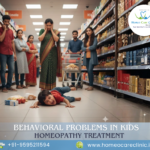Introduction
What is HIV and AIDS, really? What do the terms mean, how do people get infected, how is it treated, and what role can homeopathy play? In this guide, we’ll answer these questions in a realistic, down-to-earth way. This is for anyone who wants a better understanding: patients, caregivers, or curious readers. We also include a case study to show how care can make a difference.
Long-tail keywords for this article (used naturally): “long-term management of HIV/AIDS with homeopathy”, “symptoms of acute HIV infection”, “preventing complications in AIDS patients”.
Table of Contents
- What is HIV? What is AIDS?
- How is HIV transmitted?
- What are the stages and symptoms of HIV infection?
- How is HIV diagnosed?
- What are standard treatments and how do they work?
- What complications can arise, and how are they prevented?
- What is the role of homeopathy in HIV/AIDS care?
- Frequently Asked Questions (FAQs)
- Why Choose Homeo Care Clinic
- Summary & Next Steps
What is HIV? What is AIDS?
- HIV = Human Immunodeficiency Virus. It is a virus that attacks the immune system, specifically CD4+ T lymphocytes (sometimes called CD4 cells or helper T cells), which are essential for fighting infections.
- Over time, HIV can weaken the immune system if untreated. When the immune system becomes severely damaged and opportunistic infections or cancers occur, this stage is called AIDS (Acquired Immunodeficiency Syndrome).
What is the difference between HIV infection and AIDS?
- HIV infection refers to having the virus in the body. You might be asymptomatic, or have mild symptoms.
- AIDS is diagnosed when certain conditions are met (for example, when CD4 count drops below a threshold, or certain opportunistic infections develop).
How is HIV transmitted?
- Sexual transmission (unprotected sex with an infected partner).
- From mother to child during childbirth, pregnancy, or breastfeeding.
- Through blood: transfusions, needle sharing, or any exposure to infected blood.
- From contaminated medical equipment (if sterilization is poor).
What ways does HIV not spread?
- Casual contact (hugging, shaking hands).
- Sharing food or water.
- Mosquitoes or other insects.
- Saliva (unless mixed with blood, which is rare).
What are the stages and symptoms of HIV infection?
- Acute (primary) HIV appears 2-4 weeks after exposure. The virus is multiplying rapidly.
- Symptoms often resemble flu or mononucleosis: fever, sore throat, swollen lymph nodes, rash, muscle aches, joint pains, fatigue. Many people do not notice or misidentify the symptoms.
What is the latency stage (chronic HIV)?
- After acute infection, the virus slows down in replication. This stage may last years without symptoms. The person may look and feel healthy though HIV is still active and damaging the immune system slowly.
When does HIV become AIDS? What are symptoms of AIDS?
- AIDS is when the immune system is so weakened that serious opportunistic infections or cancers set in. Common AIDS symptoms:
- Severe weight loss (“wasting syndrome”)
- Persistent fever or night sweats
- Chronic diarrhea
- Recurrent pneumonia or other lung infections
- Opportunistic infections (e.g. tuberculosis, candidiasis, pneumonia)
- Certain cancers (Kaposi’s sarcoma, lymphoma)
- Neurological symptoms (memory loss, confusion)
How is HIV diagnosed?
- Screening tests: HIV antibody tests (ELISA), antigen/antibody combination tests. These detect HIV immune response or viral proteins.
- Confirmatory tests: If screening is positive, then confirm with Western blot, or tests like PCR (for detecting viral RNA or DNA).
- Monitoring tests: CD4 count (to assess immune status); viral load (amount of HIV in the blood).
When should someone get tested?
- If you believe you had exposure (unprotected sex, needle use, or partner status).
- During pregnancy or before childbirth.
- Routinely if in higher risk group.
What is ART (antiretroviral therapy)?
- ART = combination of medications that stop HIV from replicating. It lowers viral load to undetectable levels (so that HIV cannot damage as much and is less likely to spread).
What are the classes of drugs used in HIV treatment?
- Nucleoside / nucleotide reverse transcriptase inhibitors (NRTIs)
- Non-nucleoside reverse transcriptase inhibitors (NNRTIs)
- Protease inhibitors (PIs)
- Integrase inhibitors
- Fusion / entry inhibitors
How does early ART help in preventing AIDS?
- Helps maintain CD4 count, preserve immune function, reduce risk of opportunistic infections.
- Reduces viral load so much that risk of transmission reduces (“Treatment as Prevention”).
What opportunistic infections are common in AIDS?
- Tuberculosis
- Pneumocystis pneumonia
- Oral thrush (candidiasis)
- Cryptococcal meningitis
- Cytomegalovirus (CMV) infection
- Others depending on region
What about non-infectious complications?
- Certain cancers
- Wasting and weight loss
- Neurological issues
- Organ damage (liver, kidneys) due to HIV or side-effects of treatment
What steps help in preventing complications in AIDS patients?
- Early diagnosis and prompt ART
- Regular monitoring (CD4, viral load)
- Prophylaxis for common opportunistic infections (e.g., TMP-SMX for PCP)
- Vaccinations (where safe) e.g. influenza, pneumococcus, hepatitis B
- Good nutrition, hygiene, mental health support
What is the role of homeopathy in HIV/AIDS care?
- There are reviews and some clinical trials. For example, Traditional Indian medicine and homeopathy for HIV/AIDS: a review of the literature looked at over 200 studies including laboratory and clinical ones. They reported positive effects, but most studies had methodological flaws (small sample size, weak controls, etc.)
- A randomized, double-blind clinical trial in India showed that for people in symptomatic HIV infection (with persistent generalized lymphadenopathy), individualized homeopathic treatment raised CD4+ cell counts significantly over baseline, compared with placebo.
Frequently Asked Questions (FAQs)
Q: Can homeopathy cure HIV/AIDS?
- There is no cure for HIV/AIDS currently. ART is the proven therapy to control HIV and delay progression to AIDS. Homeopathy may help with symptoms but cannot eradicate the virus.
Q: Is it safe to take homeopathic remedies along with ART?
- Generally yes, if supervised by qualified practitioners. Remedies are very dilute and usually do not interact with ART. But always inform the ART provider about any complementary therapy.
Q: How soon after infection do symptoms show?
- Some people get acute symptoms 2-4 weeks after infection. Others remain asymptomatic for years. Symptoms depend on how quickly the immune system is affected.
Q: What is the best way to prevent HIV transmission?
- Safe sex (using condoms), avoiding sharing needles, universal precautions in healthcare, mother-to-child transmission prevention (through ART), screening blood supplies.
Q: How often should someone with HIV be monitored?
- After diagnosis and starting ART: every 3-6 months for CD4 count and viral load.
- Once stable and suppressed, maybe every 6 months or as per local guidelines.
Q: What are early signs of complications in AIDS patients?
- Persistent fever or night sweats, rapid weight loss, severe diarrhea, cough that doesn’t resolve, unexplained fatigue, new neurological symptoms.
What makes Homeo Care Clinic stand out for HIV/AIDS support?
Here are reasons grounded in care, not marketing:
- Holistic, individualized treatment
- Each patient is taken in fully: symptoms, lifestyle, emotional state, immune status. Remedies are not “one size fits all.”
- In long-term management of HIV/AIDS with homeopathy, this individualization matters a lot.
- Integrative care model
- ART remains the backbone of HIV management; homeopathy is offered as complementary support.
- Coordination with medical doctors, laboratory monitoring, safety checks.
- Experience & knowledge base
- Practitioners trained in latest research, regular case reviews, follow evidence where available.
- Use of repertories, materia medica, case histories.
- Symptom relief & side-effect management
- Helping with ART side effects (digestive upset, nausea, skin reactions).
- Improving appetite, weight, energy, mood.
- Support & counseling
- HIV/AIDS is not just physical disease: stigma, emotional hardship, mental health, social support matters. Clinic offers counseling along with remedies.
- Safe and ethical practices
- Transparent about what homeopathy can and cannot do.
- No false promises of cure. Patients encouraged to continue ART & standard medical follow up.
- Patient success stories
- Real case studies (like the one above) showing measurable improvements in CD4 count, better quality of life.
- These stories inspire trust and show what is possible under care.
Summary & Next Steps
- HIV is a virus; AIDS is its most advanced stage, marked by opportunistic infections and immune failure.
- Early diagnosis, prompt ART, and regular monitoring are essential.
- Complications in AIDS patients can be prevented through good medical care, preventive measures, nutrition, and lifestyle.
- Homeopathy offers symptom relief and quality-of-life improvements. It is best used as a complementary therapy, not a replacement for ART.
- At Homeo Care Clinic, you can expect individualized, integrative, ethical care focused on both medical and emotional well-being.
“Your health deserves more than temporary relief. Choose homeopathy for lasting results”
Start your journey towards better focus today.
Homeo Care Clinic offers a holistic approach to treating the disease. The remedies mentioned above can treat the underlying causes of the condition and offer relief from the discomfort. However, it is important to consult a qualified homeopathic practitioner for the correct dosage and duration of treatment. Homeo Care Clinic provides comprehensive care for various ailments, and offers customized treatment plans based on individual requirements.
To schedule an appointment or learn more about our treatment, please visit our website or give us a call +91 9595211594 our best homeopathy doctor will be here to help.
Follow us on Facebook, Twitter and Instagram for valuable insights into the world of homeopathy and holistic health.
- Facebook– https://www.facebook.com/homeocareclinicpune
- Instagram– https://www.instagram.com/homeocareclinic_in
- Website– https://linktr.ee/homeocareclinic
- Success Stories of Patients –https://www.homeocareclinic.in/category/case-study/
- Patient Testimonials – https://www.homeocareclinic.in/testimonial/
Chat with a best homeopathic doctor privately:
If you have any queries regarding your disease or any symptoms, click to send a What‘s App message. Our best homeopathy doctor will be happy to answer you. About Us Click
Book an Appointment:
If you want to visit our clinic, click to book an appointment.
Online treatment:
If you are a busy professional, or you are living in a remote town or city, with no best homeopathic doctor near you, Click to start an online homeopathic treatment with the world’s exclusive, most experienced and best homeopathic clinic, managed by Dr. Vaseem Choudhary world-renowned homeopathic doctor expert
About the Author Bio:
Dr. Vaseem Choudhary, is a seasoned classical homeopath with over 16 years of experience, dedicated to treating patients with compassion, precision and holistic care. Mainly in Pune & Mumbai, serving both national and international patients from UK, USA, Germany, France, Canada, Bhutan, Dubai & China. With a wide range of acute and chronic conditions—from skin disorders, hormonal issues, and digestive problems to autoimmune diseases and mental health concerns.
Dr. Vaseem is widely respected for his unique approach that combines classical homeopathy, personalized diet planning, lifestyle guidance, and a spiritual perspective on healing. He is known for his detailed and empathetic case-taking process, which focuses on treating the root cause rather than just symptoms.
In recognition of his dedication and clinical excellence, Dr. Vaseem has been honored with the Best Homeopathic Doctor in Pune award by leading platforms such as:
- Hindustan Times
- National Health Care Awards
- Pune-kar News Health Excellence Forum
He is also a contributing author to the International Journal of Homeopathy and Natural Medicines (IJHNM), where he shares his research and clinical experiences with the global medical community.
With a passion to take homeopathy to new heights, Dr. Vaseem continues to guide patients towards natural, safe, and sustainable healing.
- About Us – https://www.homeocareclinic.in/about-us/
- Our Doctors –https://www.homeocareclinic.in/team/







